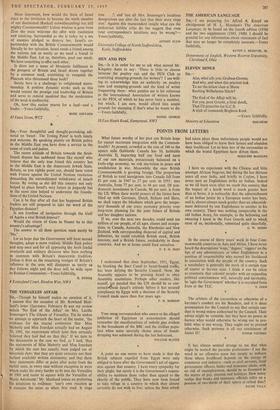POINTS FROM LETTERS What future worthy of her past can
Britain hope for except maximum integration with the Common- wealth? At present, crowded at the rate of 540 to the square mile (habitable Canada has 10, habitable Australia 5), importing half our food and most of our raw materials, precariously balanced on a knife-edge economy, we risk starvation in peace and annihilation in war. Meanwhile the once British Commonwealth is growing foreign. The proportion of British to total immigrants into Canada fell from 81 per cent. in 1947 to 27 per cent. in 1955: into Australia, from 77 per cent. to 44 per cent. Of non- domestic investment in Canada, 90 per cent. is from the US. When these world powers of the future have filled up with Germans, Dutch, Italians and Slays, we shall regret the blindness which gave the tempo- rary demands of our crazy economy priority over long-term planning for the joint future of Britain and her daughter nations.
If we, over the next two decades, could send ten million of our people, of all ages, classes and occupa- tions, to Canada, Australia, the Rhodesias and New Zealand, with corresponding dispersal of capital and industries, we could establish British stock, British interests, and a British future, unshakably in those countries. And we at home could feed ourselves.
E. F. G. HAIG
* I understand that since September, 1951, Egypt, by blocking the Suez Canal to Israel-bound traffic, has been defying the Security Council. Now, the Assembly appears to be pressing Israel to obey Assembly resolutions. Perhaps other readers, like myself, Ire puzzled that the UN should be so con- eernedonout Israel's attitude before it has secured compliance by Egypt with a decision of the Security Council made more than five years ago.
F. H. NORMAN
* Your smug correspondent who sneers at the alleged jubilation of Egyptians at assassination should remember the manifestations of unholy glee evident in the broadcasts of the BBC and the civilian popu- lace when some specially choice piece of bomb- dropping was achieved during the last holocaust.
WILLIAM SLATER
* A point no one seems to have made is that the British subjects expelled from Egypt were only obliged to leave after the Government's act of aggres- sion against that country. I have every sympathy for their plight, but surely it is the Government's respon- sibility to maintain them rather than appeal to the charity of the public. They have now been forced to take refuge in a country in which they almost certainly do not wish to live; unless the Suez attack
had taken place these unfortunate people would not have been obliged to leave their homes and abandon their livelihood. Let us hear less of the extremities to which the brutal Egyptians have driven them.
ROSALIND MAZZAWI
I have no experience with the Chinese and little amongst African Negroes, but during the last thirteen years all over India, and briefly in Ceylon, I have never seen an Englishman strike an Indian. Indeed as we all learn soon after we reach this country that the impact of a harsh word is much greater here than at home, it is noticeable that the admonishment of an Indian junior by a European senior has been, and is, almost always much gentler than an admonish- ment delivered by one Englishman to another in his own country. There was nothing comparable in the old Indian Army, for example, to the bellowing and swearing I knew in the Foot Guards and to which most of us, incidentally, submitted quite cheerfully.
G. W. DENBY
*
In the course of thirty years' work in four Com- monwealth countries in Asia and Africa, I have never heard the descriptions 'wogs,"dagoes,"niggers' on the lips of any administrator or other Englishman in a position of responsibility who earned his livelihood in association with the people of the country. Such a vocabulary is generally the mark of a certain type of tourist or Service man. I think it can be taken as axiomatic that colonial peoples with an expanding political consciousness will, naturally and inevitably. be 'agin the Government' whether it is recruited from Eton or the TUC. T. EDEN
* The arbiters of the correctness or otherwise of a barrister's conduct are his Benchers, and it is sheer presumption for the Council to say that certain con- duct is wrong unless authorised by the Council. Their advice might be valuable, but they have no power to licence what would otherwise be wrong nor to pro- hibit what is not wrong. They ought not to pretend otherwise. Such pretence is all too reminiscent of
James II! JUNIOR COUNSEL
*
It has always seemed strange to me that what might be termed the parasite professions—I use the word in no offensive sense but simply to indicate those whose livelihood depends on the energy of commerce and industry—such as civil servants, local government officers, banks and insurance clerks, with no risk of unemployment, should be so favoured in the matter of pay, pension and holidays. How many realise that banks and insurance officials retire on a pension of two-thirds of their salary at retiral date?
RALPH TULLY


































 Previous page
Previous page